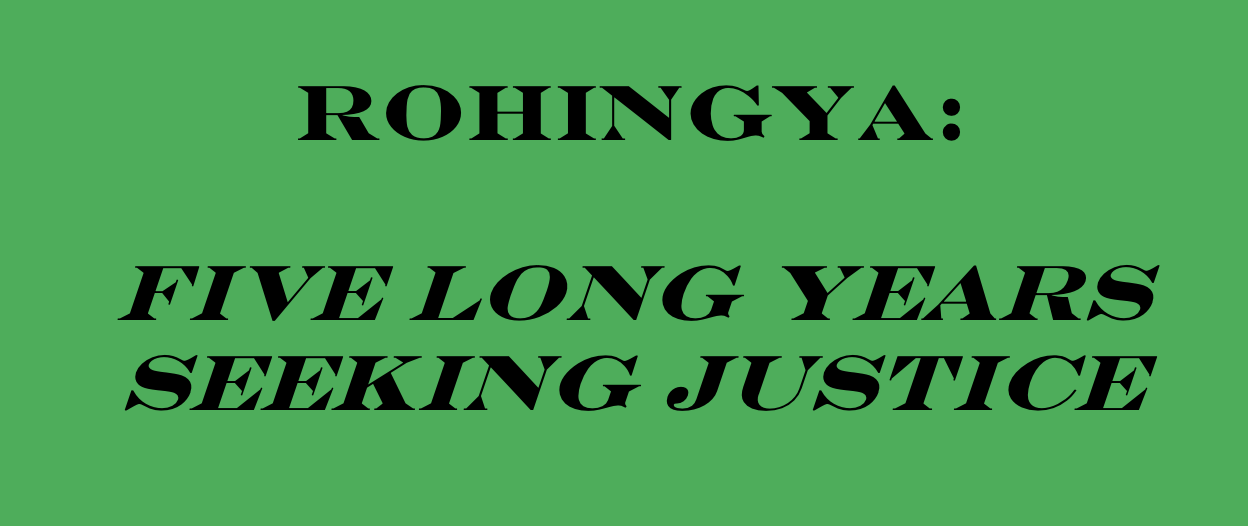[Note: this post was intended as an op-ed. Mohammad Azizul Hoque of the Centre for Peace and Justice in Dhaka, Bangladesh contributed to this essay. Hoque and his colleague Tasnuva Ahmad wrote an excellent article on this important five year anniversary.]
Five long years seeking justice
August 25, 2022 marks the five year anniversary of the Rohingya genocide. This ethnic and religious minority has spent five long years seeking justice.
The facts are both clear and stark. Five years ago the Rohingya people were the victim of a genocide by the military junta controlling Myanmar. Beginning August 25, 2017 nearly 800,000 Rohingya fled across the border into Bangladesh. Some 140,000 Rohingyas were internally displaced in the melee and herded into IDP camps, where they have remained ever since. Though the Rohingya diaspora nearly global in reach, most are concentrated in Indonesia, Malaysia, Thailand, and India, with the vast majority of these genocide victims now residing for the lkast five years in the largest refugee camp in the world in Cox’s Bazar, Bangladesh.
reach, most are concentrated in Indonesia, Malaysia, Thailand, and India, with the vast majority of these genocide victims now residing for the lkast five years in the largest refugee camp in the world in Cox’s Bazar, Bangladesh.
The Bangladeshi government, with support from the United Nations and the humanitarian sector, has hosted nearly one million Rohingya refugees for the last five years, an incredible hardship on a nation already burdened with economic, political, and climate related issues.
Another fact is that the International Court of Justice, the principal judicial organ of the United Nations, has ruled it has jurisdiction on the case of The Gambia v. Myanmar and already has provided preliminary statments and rulings indicating that indeed a genocide occurred. Most in the global community agree.
Currently in Myanmar we know that there is ongoing violence against both the Rohingya and other minorities. There has been a 18 month long struggle in Myanmar by grassroots organizations against the military junta. A broad alliance of people and organizations are seeking democracy and freedom from the brutal and bloody autocratic military rule.
Another fact is that this is not a simple situation. The geo-politics surrounding Myanmar are complex and involve major world powers including India, China, Japan, the United States, and Russia. The UN has struggled to navigate the complex and sometimes confrontational negotiations among the many stakeholders in the region, and progress is slow to non-existent..
We know that Myanmar is itself a victim of past colonial oppression and that like many postcolonial nations continues to suffer from a lack of true freedom for most who live there. We know that its military leaders appear more committed to themselves and to the wishes of external powers and governments than they have to their own people. We know that the government of Myanmar historically has been very keen to segregate and discriminate against various religious and ethnic minorities, none more so than the Rohingya people who had their right of citizenship stripped in 1982.
We also know that the United States has joined the growing chorus of nations who are condemning the government of Myanmar for its actions against the Rohingya and calling it exactly what it is: a genocide.
We know that various economic sanctions including, unilateral sanctions by various nations including the United States and multilateral sanctions orchestrated by such organizations as the UN, the EU, and ASEAN have had some but not sufficient impact on the political situation in Myanmar.
Critically, we also know that the vast majority of Rohingya simply want to be safely repatriated back to Myanmar. This is a goal shared by both the Rohingya people and the Bangladeshi government. Having a situation in Myanmar where the Rohingya could move back with full citizenship, with real and assured safety, and with full rights is a goal that the vast majority of Rohingya, Bangladeshis, and global citizens would agree to. The only group that seems to uniformly reject this goal is the current military government in Myanmar. Progress has been glacial toward creating a political situation in Myanmar that would allow for appropriate repatriation.
We know that living as a refugee is absolutely not what anyone would wish to do. We also know that ignoring the situation, especially by those who have the luxury of power, is not an option. We know that as Edmund Burke told us long ago “the only thing necessary for the triumph of evil is for good men [people] to do nothing.”
That said, what is there to do? If you are able to read these words you have the privilege of an education and most likely the privilege of having access to the email boxes of various political representatives both in your nation and internationally. You can use your voice to join others in renouncing the government of Myanmar and encouraging deeper and more effective sanctions against the ruling military leadership in Myanmar. Our actions can make an impact.
There is a line between those who care and those who care enough to act. In this case we are talking about a genocide and the long-term impacts of that genocide on nearly 1 million Rohingya and, ultimately, making reparations to those who were victims of this genocide. And to send them home.
I hope that you care enough to act on behalf of or rather in partnership with the Rohingya people, the people of Bangladesh, and frankly all those globally who seek a world characterized by justice, freedom, and dignity for all.
Five years is a long time to live as a refugee, to have lives, careers, education, and hopes put on hold or severely restricted.
Five years seeking justice is too long. The global community -people like you and me- must respond.


 Follow
Follow